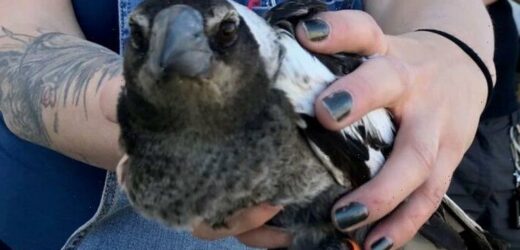Conservation biologist: We should improve habitats to help birds
We use your sign-up to provide content in ways you’ve consented to and to improve our understanding of you. This may include adverts from us and 3rd parties based on our understanding. You can unsubscribe at any time. More info
Researchers had been training up birds to come to a feeding station, where they would then catch them and attach a GPS tracking device to the animals via a special harness. The aim was for the birds to later come back to the feeding station, where a magnet would let go of the tacking device without the need to catch them again.
But instead, something rather spectacular happened.
The researchers from the University of the Sunshine Coast in Queensland, Australia ended up getting duped by the brainy birds.
Joel Crampton, a PhD student and Dr Dominique Potvin, leading the study, said they saw one of the adult female birds pecking at the harness of a younger bird.
This set the young bird free from the harness in a stunning display of teamwork
Dr Potvin, said: “This shows high levels of cognitive ability and also cooperation – helping others seemingly without getting a reward.


“This kind of ‘rescue’ behaviour has only been documented in a handful of birds and is a remarkable indication of tight social structures and relationships.
“We first trained the magpies to come to the feeding station, then caught them and put them in the special harnesses containing the GPS tracking devices.”
What makes this even more surprising is that the birds recognised they could not get rid of the harnesses alone.
They ended up teaming up to escape the clutches of their trackers in a masterful display of intelligence.
Dr Potvin said: “Of course, every time you put a tracker on a bird, it takes a bit of getting used to, so the magpies were adjusting and turning their heads to try to grab it.

“But the harness isn’t accessible by the birds. Well, by themselves. We didn’t count on them asking for help from each other.
“This is quite a feat, because there is only one weak point on the harness, which is where it would have been released by the magnet.”
After the researchers spotted the first birds helping each other to escape, later none of the five birds had their harnesses left on.
The experts said this shocking outcome could reveal further insights into the cognitive abilities of this fascinating species.
Mr Crampton said: “To our knowledge, this is the first study to report the removal of GPS trackers within members of the same species and should be considered when planning future tracking studies especially on highly social species, such as magpies.”
DON’T MISS
Poland ‘under attack’ – fears for Ukraine’s neighbour over Ukraine war [REPORT]
Putin strikes! Russia cuts gas supply after Biden’s troops make ‘de… [INSIGHT]
Ukraine crisis: Millions of Britons to feel impacts from ‘shortages…[REVEAL]


The findings were published in the scientific journal Australian Field Ornithology on February 15, 2022.
Over 40 million birds have vanished from the UK in 50 years.
Magpies can still be found across England, Wales and Northern Ireland, but are more localised in Scotland, being absent from the Highlands.
The magpie is one of the most common birds in Britain and unmistakeable pattern, being mainly black with a white stomach and patches on the shoulders and wings.
Source: Read Full Article


